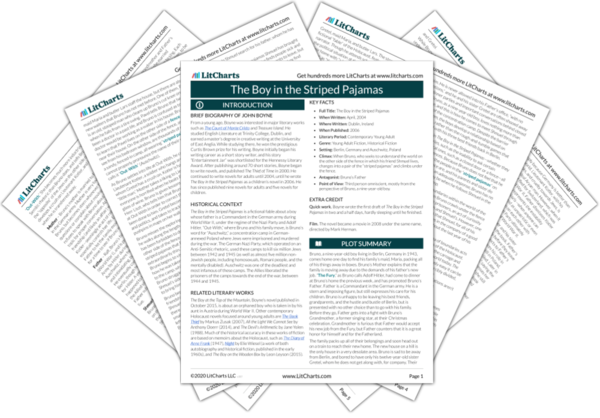Innocence and Ignorance
Bruno, the main character of The Boy in the Striped Pajamas, is a nine-year-old boy who is the son of a German Commandant (Father) during World War II. Father has been rising in the ranks of the Nazi army, and Bruno has lived a sheltered life in Berlin with his Mother, sister Gretel, maid Maria, and butler Lars. The story, which is a fictional “fable” of the…
read analysis of Innocence and IgnoranceBoundaries
Bruno’s world in The Boy in the Striped Pajamas is filled with places he is not allowed to go, and the reasons for these boundaries are rarely explained to him. He is never allowed into his Father’s office, “with no exceptions,” and he and his sister Gretel are often shooed away from dinner parties and important conversations behind closed doors. Bruno, as a nine-year-old boy, loves nothing more than to explore, and this…
read analysis of BoundariesFamily and Friendship
Family and friendship are both important themes for Bruno, as he struggles to determine what role he plays in his household, and how to approach his friendship with Shmuel. Bruno has not been indoctrinated with a hatred for Jews, despite the fact that his father is high-ranking Nazi officer, but his parents do stress that he is not allowed to go near the fence, and his father refers to the people in…
read analysis of Family and Friendship
Nationalism
During World War II, the Nazi Party, which gained control of Germany, operated on the idea that ethnic Germans were superior to the rest of the world, particularly the Jewish population in Europe at the time. Nazi rhetoric and propaganda operated heavily on the idea of the “other”—emphasizing an “us vs. them” division, and demonizing and dehumanizing “them.” In practice this meant attempting to prove, using pseudoscience, the Bible, nationalism, and scare tactics, that Jews…
read analysis of NationalismGender Roles
The perpetuation of traditional gender roles is present throughout the novel, and contributes to much of the misinformation and miscommunication between the characters. Father is the definitive patriarch of the family, and he is in charge of what the entire family does and where they go. Bruno aspires to be as big and strong as his father, but also feels conflicted in his relationship with his father because of how he appears to treat Mother…
read analysis of Gender RolesComplicity
Though most of the characters in the novel are not explicit members or supporters of the Nazi party, many of them end up complying with the regime’s ideals and goals out of a sense of duty, fear, or apathy. Mother, though she is not thrilled with Father’s new job as a director of the concentration camp Auschwitz, does not actively fight his decision to move the family. This seems to stem from a sense of…
read analysis of Complicity






